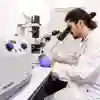



Spark curiosity and inspire the next generation of scientists by teaching biology at the secondary level.
Our innovative two-year degrees offer a fast-track route into teaching, perfect for those passionate about biology and eager to share their knowledge. Whether you’re changing careers or taking your first step towards a PGCE, this course equips you with the skills to engage and educate students.
You’ll explore curriculum design, learning theories, and what helps students thrive - while deepening your expertise in key biological areas like zoology, microbiology, evolution, cells and organelles, and more. Bring science to life in the classroom and shape future biologists.
About this course
Be part of the lasting impact that education has on people's lives on this accelerated route towards a PGCE or taking on a teaching role in schools.
You’ll learn about children’s and young people’s development and needs. And explore education theory, research, policy and practice.
Opportunities to reflect on professional practice include a work-based module at the end of your first year. As well as visits to diverse learning environments such as mainstream and special schools, alternative provision, galleries and museums. You can also study towards an accredited Forest School certification, so you can lead children’s learning outdoors.
Our extensive network of 600+ charities, education-related organisations and schools gives you invaluable learning experiences such as guest lectures and professional practice observations. As well as opportunities to take your placement in the UK or overseas.
You'll work alongside biology experts to explore key scientific principles, research, and real-world applications. From microbiology to evolution, you'll develop the subject knowledge and analytical skills needed to understand the complexities of living organisms.
It's in our DNA to make a difference
Module options
The course consists of 180 credits per year. Most modules are 20 credits, meaning you'll study nine modules each year. Some longer modules, such as a dissertation, are worth more (e.g. 40 credits). In these cases, you’ll study fewer modules - but the number of credits will always add up to 180 credits.
Filters
Introduction to Education
This module sets the scene for the programme, starting with your own background and experience and exploring what education means, how it differs from schooling and key concepts and approaches. It will also help you to develop the academic skills necessary for your degree programme.
compulsory
20 credits
Microbiology
How does microbiology govern our world? In this module you will learn the basic principles of microbiology, before exploring the interplay between microbes, ourselves, and the wider environment.
compulsory
20 credits
Cells and Organelles
Explore the fascinating inner workings of cells, giving you a foundation in areas such as cell biology, molecular biology and biochemistry.
compulsory
20 credits
Education Theory
This module explores the “Big Questions” in Education, drawing on key thinkers and theorists from across many periods of history and diverse locations across the globe. It will prepare you for undertaking your own research later in the degree, and provide broad horizons to challenge some of your preconceptions and expectations about education.
compulsory
20 credits
Evolution
Why did sex evolve? Why do we die? What is a species? How can evolutionary medicine help us? This module will provide you with an understanding of how life on earth came to be what it is, from genes to species. Without evolution, nothing in biology makes sense.
compulsory
20 credits
Education Specialism
Following focused input from your lecturers, this module provides the opportunity to explore a particular topic of interest to you, supported by a tutor. Whether you want to learn more about child development, pedagogy, approaches to behavior management or an aspect of the school curriculum, you will be supported to develop critical insights into real life practice.
compulsory
20 credits
Reflective Practice 1
This module provides opportunity to engage in an extended period of work experience (paid or voluntary) and reflect on the learning environment in which you are based. Whether in a location local to home, or visiting a more distant place, there is flexibility to explore your interests as well as deepening your understanding of learning and children’s development to prepare you for applying for a teacher-training course.
compulsory
40 credits
Reflective Practice 2
In this module you will hone your skills in reflective practice, reflecting on contributions from a variety of speakers and experts in addition to visits to a range of learning settings for children of different ages. This will include both formal and informal learning settings.
core
20 credits
Genetic Analysis
This module takes a problem-based approach to understanding modern Molecular Genetics and Genomics. Students will learn to participate in current debates and become accustomed with modern methods of laboratory investigation and genetic data analysis. A week-long laboratory session allows students to participate in current research and prepares them for careers in the molecular laboratory. This module focuses on Eukaryotes. It is also expected that students are already familiar with the basics of Genetics that was taught in Molecular Biology and Genetics.
core
20 credits
Our facilities

Watchlist
Michelle Wormald
Course overview
2 mins
A degree that goes beyond the classroom
Course montage
1 min
Rewilding Reading
Course Highlight
9 mins
Life on campus
University life
2 mins
The Gold Standard for Teaching
University life
1 min
Featured academics
You'll benefit from the outstanding support of academic staff who are experienced education practitioners.
Our research is driven by the belief that education can challenge inequalities and injustices in society, and seeks social and educational change to enhance fairness, equity and social justice.

Shelley Hindley
Lecturer
Shelley has 10 years experience in secondary schools including as Head of French and Head of German. She was an assessor for the General Teaching Council’s Teaching and Learning Academy and co-led Teacher Effectiveness Enhancement Programme courses.

Holly Smith
Lecturer
Holly has over 10 years’ experience teaching in secondary schools. Her research interests include reading for pleasure and drama as an engagement tool for learning.
Entry Requirements
What do I need?
This course is currently available through Clearing, which means our entry requirements are a bit different to what they would normally be.
At Hull, you're a name not a number. During Clearing, we look at all of your qualifications and experience, not just your academic grades. We may be able to offer you a place whatever your situation. Get started by completing our eligibility checker, and find out immediately if you could study at the University of Hull.
Have questions? Our admissions team will be happy to help.
Fees & Funding
How much is it?

Future prospects
After you graduate, you can go on to work in schools as an unqualified teacher, or start initial teacher training leading to Qualified Teacher Status (e.g. PGCE).
Graduates also pursue other postgraduate studies, work as home education tutors, education consultants, teach abroad, or take up educational roles in the arts, heritage or local government sectors.
Become part of the next generation of futuremakers
Like what you've seen? Then it's time to apply.
The standard way is to apply through UCAS. This will give you the chance to showcase your skills qualities and passion for the subject, as well as providing us with your academic qualifications.
Not ready to apply yet?
Visit our next Open Day, and see all that the University of Hull has to offer. Talk to our lecturers about your subject, find out what university is really like from our current students, and take a tour of our beautiful campus and amazing facilities.
You may also be interested in...
100% employability (Teacher Education) UK domicile full-time first degree leavers; Higher Education Graduate Outcomes statistics, for the academic year 2022/23, published by the Higher Education Statistics Agency June 2025.
Education is ranked Joint 1st in the UK for Value Added Score. The Guardian University Rankings 2026.
All modules presented on this course page are subject to availability and this list may change at any time.